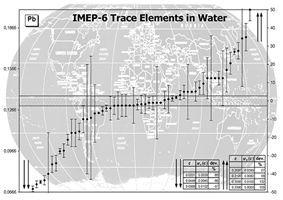
> Quality
of Chemical Measurements
> Europe's Favorite Chemists?
> News and Notices
> Symposia Reports
> New Projects
> Awards and Prizes
> New Books
> Commissions Reports
> Conference
Announcements
> Conference Calendar
Chemistry International
Vol. 23, No. 1
January 2001
Quality of Chemical Measurements
International Evaluation Program Reveals True Situation
by Philip D. P. Taylor, Ioannis Papadakis, Lutgart Van Nevel, Ciaran Nicholl, and Prof. Paul De Bièvre*
International Measurement Evaluation Programmes, IMEP Institute for Reference Materials and Measurements, IRMM Related IUPAC Projects Commission on Isotope Specific Measurements as References
to quality issueseqalm bipm ccqm citac eurachem Introduction
Background
The Problem
The BIPM Gets Involved
IRMM’s International Measurement Evaluation Program (IMEP)
A Practical Example: IMEP-9 Trace Elements in Water
The Way ForwardThe wide variation in chemical trace measurements was first brought to my attention by Prof. De Bièvre at the 1998 meeting of the Committee on Chemistry and Industry (COCI) in Johannesburg, South Africa. During our 1999 meeting in Berlin, Germany, he again presented data demonstrating a huge (�50%) variation in trace element (Pb, Cd, Fe, and Zn) concentrations in water even from "accredited" laboratories. Similar problems were demonstrated for analysis of catalyst metals (Pt) in car exhaust material. Because such data are increasingly used in decision-making areas of industrial concern, our committee adopted "Reliability of Chemical Measurements" as a new, formal project, with Prof. De Bièvre as coordinator. Interest was immediately demonstrated by UNESCO (Dr. A. Pokrovsky), and cooperative information dissemination efforts began. Although a brief summary of the concerns, "Metrology in Chemistry", had been published in Chemistry and Engineering News (C&EN, 31 May 1999, p. 29), COCI encouraged Prof. De Bièvre to submit a more detailed summary to Chemistry International (CI). This article provides "snapshot" pictures of chemical measurement (un)reliability, with many practical, societal implications.
Dr. A. Nelson Wright
Chairman, IUPAC Committee on Chemistry and Industry (COCI)
Chemical measurements form the basis of many important economic, political, environmental, medical, and legal decisions. Each day, millions of such measurements are carried out throughout the world. The real basis for decision-making and implementing regulations depends on the comparability and reliability of the results of these chemical measurements. The European Commission requires that measurements performed in one Member State must be acceptable to all other Member States in the Union. This process requires that such reliability be demonstrated. Moreover, the results of European chemical measurements must also be transparent and clearly understood by Europe’s trading partners in the whole world and vice versa. Globalization of commerce and the need for fair trade require knowledge of the degree of equivalence of the measurement results as they affect the value of traded goods.
[More]
* IUPAC’s Committee on Chemistry and Industry (COCI) has submitted the above article, prepared by Dr. Philip D. P. Taylor (Joint Research Centre-European Commission, Institute for Reference Materials and Measurements, Retiesweg, B-2440 Geel, Belgium; E-mail: [email protected]), Dr. Ioannis Papadakis ([email protected]), Mrs. Lutgart Van Nevel ([email protected]), Dr. Ciaran Nicholl ([email protected]), and Prof. Paul De Bièvre (Duineneind 9, B-2460 Kasterlee, Belgium; E-mail: [email protected]). COCI Chairman Dr. A. Nelson Wright (12539 Ranger, Montreal, Quebec H4J 2L7, Canada; E-mail: [email protected]) contributed the Introduction.
News
and Notices - Organizations and People
- Standing Committees
Divisions
- Projects - Reports
- Publications - Symposia
- AMP - Links
Page last modified 26 April 2001.
Copyright © 1997-2001 International Union of Pure and Applied Chemistry.
Questions or comments about IUPAC, please
contact the Secretariat.
Questions regarding the website, please contact [email protected]

